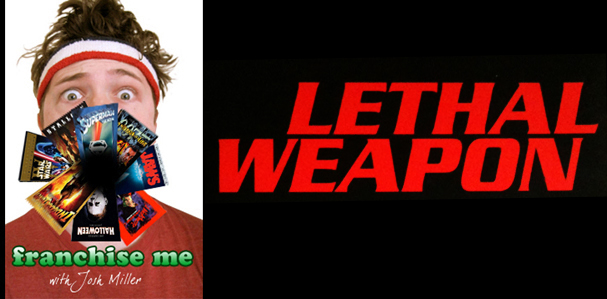
Hollywood loves a good franchise. The movie-going public does too. Horror, action, comedy, sci-fi, western, no genre is safe. And any film, no matter how seemingly stand-alone, conclusive, or inappropriate to sequel, could generate an expansive franchise. They are legion. We are surrounded. But a champion has risen from the rabble to defend us. Me. I have donned my sweats and taken up cinema’s gauntlet. Don’t try this at home. I am a professional.
Let’s be buddies on the Facebookz!
The Franchise: Lethal Weapon — following the personal and professional lives of aging and put-upon Los Angeles homicide detective Roger Murtaugh and his loose-cannon partner Martin Riggs. The franchise comprises four feature films, from 1987-1998.
The Installment: Lethal Weapon (1987)
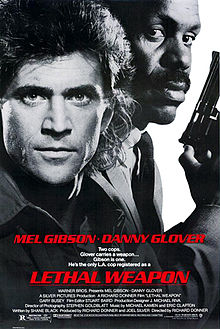
The Story:
Detective Roger Murtaugh (Danny Glover) has just turned 50. He’s not too happy about getting older, but he can’t complain either. He is happily married with a good family life and he is respected at work. Detective Martin Riggs (Mel Gibson) isn’t doing quite so well. Since Riggs’ wife died in a car accident he has been living in a trailer on the beach, where he gets drunk before work and jams the barrel of his gun in his mouth everyday. His obvious death-wish has made him a pariah with his coworkers, who can’t decide if he’s completely insane or just pretending to be completely insane to get workers’ comp. So Murtaugh isn’t happy when Riggs is assigned as his partner. But together the two men quickly find common ground and build a friendship as they uncover a drug cartel run by ex-military operatives, who are responsible, among other things, for killing the daughter of Murtaugh’s former Vietnam buddy (Tom Atkins).
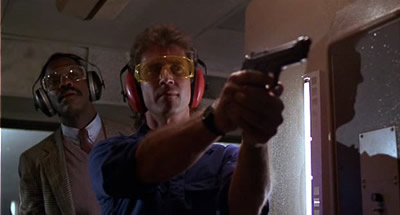
What Works:
Lethal Weapon is hardly the first ‘buddy cop’ movie. Or the first to use the Roger Ebert-coined “Wunza” gimmick — as in “One’s a ____, the other is a ____. Can they work together to do what needs to be done?” It isn’t even the first to pair a white guy with a black guy, coming a year after Running Scared, five years after 48 Hrs, and two full decades after In the Heat of the Night. If anything, this sort of film was already getting stale by 1987. Even the Vietnam vet angle was tired as hell. This was the point in the evolution of the cop movie subgenre where things either needed to be pushed to the outer limits to stay fresh (Turner & Hooch), or re-invention needed to happen (Die Hard). Interestingly, Lethal Weapon takes neither of those approaches. If anything, for a movie made well into the 80’s and written by a cocksure lad in his twenties, the film feels oddly behind the times, almost unhip, a hodgepodge of recycled themes and elements from other films as diverse as True Grit to First Blood. Yet despite all this, Lethal Weapon feels vibrant. And the reason rests almost entirely on the shoulders of…
The casting.
Danny Glover and Mel Gibson are why Lethal Weapon is the movie that it is. The film launched Shane Black like no other film has really launched a new screenwriter in recent memory, save for Scream and Kevin Williamson, and while Black is most certainly a cut above Williamson, proportional to the history-making paychecks he started receiving immediately after Weapon, I think Black ranks as an over-valued writer (I like Black, so let’s keep in mind I said “proportional”). On paper Weapon is not an overly impressive film. Its concept is cheesy and its tone somewhat juvenile. Butch Cassidy and the Sundance Kid wouldn’t have been a masterpiece without Paul Newman and Robert Redford, but it still would have been pretty good, because William Goldman’s script is a masterwork in itself. I have a hard time buying that Lethal Weapon would be much more than an 80’s footnote without Gibson and Glover. Super-producer Joel Silver deserves much credit for sensing the potential in Black’s B-movie script, but whoever suggested pairing Gibson and Glover is the real genius on this production. You could teach an acting seminar on the chemistry displayed in Lethal Weapon.
Great chemistry is impossible to force. It is also impossible to describe much beyond simply noting its presence. We all know that actors who hate each other can have great chemistry, while lovers can have terrible chemistry, and visa versa just as often. I don’t know why Gibson and Glover are so electric together. And neither do you. They just are. They feed off each other’s energy and generate a whole new, better energy together. For such a shamelessly violent film, there is a casual pleasantness to everything because of Riggs and Murtaugh’s relationship. The scene in which Riggs bests Murtaugh in target practice – Riggs smugly humming as he sends his target impossibly farther and farther away before actually shooting – is one of the best buddy cop moments in the history of the subgenre. Gibson and Glover actually make stale sitcom-grade jokes about Mrs. Murtaugh’s awful cooking fun to listen to, and more importantly, they make the film’s bonkers storyline not only acceptable but an afterthought. Once Gibson and Glover clicked, this movie could have been about almost anything and I wouldn’t have cared. I would watch Riggs and Murtaugh fish for thirty-minutes as long as Murtaugh bitched about how Riggs was baiting his hook, and Gibson and Glover were playing the parts. This is the essence of a franchise right here, the dragon studios are always chasing. Sequeling a premise is tough. Sequeling characters is easy.
The casting is all-around interesting. Gary Busey is a very unlikely choice for the steely, calm Mr. Joshua, but his hair and teeth alone sell the character. The always great Tom Atkins, as Murtaugh’s pivotal ex-Vietnam buddy Michael Hunsaker, is a welcome presence. The casting of the Murtaugh family has a warm Spielberg vibe. And though this really has nothing to do with anything, I love watching 80’s action movies and waiting patiently to see Sven-Ole Thorsen, always confident that he’ll pop up somewhere to at least get shot.
I don’t mean to leave Black and director Richard Donner out in the cold though. Gibson and Glover aren’t just fishing in a boat here. The characters of Riggs and Murtaugh are good ones. Riggs of course is the center piece of the film. He is the “lethal weapon” after all, as Murtaugh notes. And Black’s core conceit for Lethal Weapon – to feature a cop whose heroism is driven by a depressive death-wish instead of bravery – is surely the seed of potential Silver saw in Black’s original script. This is the whole hook. For the first several scenes, you could disregard Lethal Weapon as a better-written Cobra, about yet another gruff 80’s super-cop-who-doesn’t-play-by-the-rules. Then Riggs sticks a gun in his mouth and cries. That’s when Lethal Weapon suddenly becomes tenfold more intriguing. Gibson is a perfect match for the character. Just the way Gibson pivots the delivery of the line “I’m hungry. I’m going to get something to eat” midway through, defusing the crazed-rage he’d built up arguing with Glover into snarky amusement, is a small star-making moment. Riggs allows Gibson to show off all his specialties — the crazy-eyes stare, the manic energy shifts, the neo-Cary-Grant delivery, and his great ability to seem injured. Seriously, no one plays “I’m in horrible pain, but I will fight through this” quite like Gibson.
But for all Riggs flair, Murtaugh is the true heart of Lethal Weapon. Murtaugh is our window through which the story and Riggs are framed. Riggs achieves a kind of peace at the end of the film, but Murtaugh is the one who goes on a hero’s journey. The film opens on Murtaugh’s 50th birthday, and as the film’s running “I’m too old for this shit” gag highlights, Murtaugh’s age is very important to the character. He shaves his beard to look younger. His smile at the precinct’s shooting range, after some quality target practice, let’s us know that Murtaugh needs to remind himself that he’s still got it. His life is great and he is happy, but his maleness is left insecure by his own comfort — he has macho ennui. So Riggs at first offends him, because there is the part of Murtaugh that wishes to be so formless, and by the end of the film this hidden part of him is released by circumstance. Murtaugh is reborn. Riggs needs Murtaugh’s stability, and Murtaugh needs Riggs lack of stability. It is a little hacky, but it works on a very basic level. And Glover’s wheezy voice is perfect for Murtaugh’s bitching (especially considering that Glover is 40 playing 50).
Speaking of dialogue. Shane Black’s gift is dialogue — a reason that he has been far more prolific as a high-paid script doctor than writing original stories. Banter and one-liners have always been part of action movies and particularly the buddy cop subgenre, but Black’s banter has a special flavor to it, verging on satire yet maintaining sincerity to its present form (it would later verge into actual satire in other films). There is a Howard Hawksian touch to his banter, like when Murtaugh notes that one of their leads is “thin,” and Riggs responds, “Anorexic.” He has a nimble way of punching-up lines that other writers might not even think to punch-up, like after the film’s sub-boss Mr. Joshua (Gary Busey) tries to kill Riggs, and Riggs identity’s Joshua by saying, “I never forget an asshole.” More so than their many predecessors, Murtaugh and Riggs really become a classic comedy duo, their every exchange formatted as a comedy stage routine — Murtaugh: God hates me, that’s what it is. Riggs: Hate him back. Works for me. — to the point where they eventually become outright comedy pranksters, going so far as to leave a note for Mr. Joshua (during what in real life would be an incredibly emotional and tense period) that reads “Dear Bad Guys. No one here but us COPS. Sorry! The Good Guys.”
This film is also un-ending gonzo set-pieces. The eery opening suicide. Riggs as the sole undercover agent in a drug bust taking place in a Xmas tree lot. The famous scene in which Riggs hand-cuffs himself to the wrist of a wouldbe suicidal jumper, and pulls the man off the building — landing on a pad below. The drug-house pool scene. The funeral sniping. The desert hostage exchange. The torture sequence. The post-torture killing-spree escape. Riggs and Mr. Joshua’s water-soaked final showdown. All of which happens to our characters in the span of like two days. And on Christmas for some reason. The fact that Donner can string this all together without having the movie come off as pure exploitation like Commando is impressive. The movie has a strange tone, a blend of deadly serious melodrama and tongue-in-cheek wacky — which Donner kicks off from the very beginning, opening the film with “Jingle Bell Rock” as we transition into a scene in which a naked model does coke and then throws herself off a balcony onto the roof of car. Really, Donner manages to bring a level of almost incongruous cuteness to Lethal Weapon, which often makes the film’s highlights small human moments instead of the gonzo action bits. The scene where Riggs eats dinner with Murtaugh’s family, and Murtaugh grows increasingly uncomfortable watching his teenage daughter Rianne (Traci Wolfe) flirt with Riggs, is priceless.
And, though I wouldn’t say it is amazing, Michael Kamen’s score (with guitar by ax-god Eric Clapton) establishes recognizable themes for the film — with lots of sexy 80’s guitar and saxophone stings and cues.
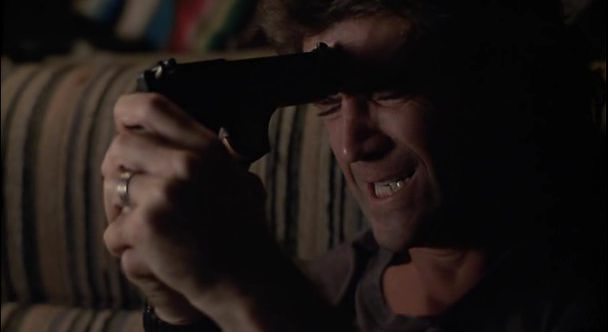
What Doesn’t Work:
Beneath the charming good-times of Lethal Weapon lies a very immature movie with fairly little regard for its own implications. If we connect the dots throughout the movie, we will walk away with a strong overall message: killing people is both fun and necessary. Now, I would hope it goes without saying to any regular Franchise Me readers out there that I am a fan of senseless carnage. This is not that issue. But context is everything. Lethal Weapon, as I said, is not Commando or Death Wish 3. Based on its warm tone and what the film itself is telling us, Lethal Weapon should not have anywhere near as much killing as it does — certainly not at the hands of our two lovable and heroic cops. One of Black’s funnier running gags in the film is that Riggs just can’t help killing everyone he comes into contact with. Murtaugh: “You ever met anyone you didn’t kill?” Riggs: “I haven’t killed you yet.” These moments are funny, but they add up and sit awkwardly with the more dramatic currents of the film. This isn’t TV’s Sledge Hammer!. And Riggs’ trigger-happiness isn’t always played for laughs either. A dramatic moment between Riggs and Murtaugh comes when Riggs confesses to Murtaugh that the only thing he’s ever been really good at is killing people. He relates a Vietnam story of shooting a man from 1000 yards in high wind, which Riggs claims only eight or nine people in the world could do. His super power is murdering people. And since the death of his wife, being a cop is all he lives for. The implications here are actually horrifying — Riggs lives to fight crime and the only way he knows how to fight crime effectively is to kill people, so, in a sense, Riggs lives to kill. He just can’t help himself because it comes so easily.
That is actually interesting, and it ties in nicely with the dark core of Riggs’ character. The problem is, this detail is steam rolled by the rest of the film, which almost farcically goes out of its way to validate Riggs’ insatiable trigger finger. Not only does Lethal Weapon validate Riggs, the movie invalidates poor Murtaugh for his apparently ignorant view that cops shouldn’t shoot to kill. First this comes during a scene where our heroes burst in on a drug house — Murtaugh shoots a goon in the leg, pointing out to Riggs that it is possible to subdue a perp without just shooting them through the heart. Then the man attacks Riggs and Murtaugh again, forcing them to drown him in a swimming pool. Later, moving into the finale, Riggs tells Murtaugh, “You do this my way. You shoot; you shoot to kill.” By the time the movie is over, Murtaugh has completely come around. How far has he come around? When Riggs gets into his final showdown with Mr. Joshua – who is meant to be “evil” Riggs; also special forces but now killing for money instead of an 80’s sense of justice – their fist-fight takes place in a circle of cops. Hardly a fair fight situation, as it’s not like the cops will let Mr. Joshua win. Odds already in Riggs favor, when Riggs finally gets the upper-hand on Joshua, Murtaugh screams “Break his fucking neck!” The fact that Murtaugh screaming this line isn’t meant to demonstrate that Murtaugh has gone over to the darkside, or hit rock bottom, says it all. In fact, if anything, this is the final moment of Murtaugh’s journey quest, reclaiming his manhood. Then, just when we think that maybe the movie is going to have something positive to say about violence, when Riggs responds to Murtaugh saying, “It’s not worth it,” of course, Mr. Joshua steals a cop’s gun, “forcing” Riggs to shoot and kill him. Riggs and Murtaugh walk away from this movie with their arrest record at zero. They killed nearly every single criminal we see in the film. Criminals don’t deserve to live and trying to be the bigger man and not kill them is a waste of time, because all criminals will shoot their guns at you with absolutely no concern for their own safety or mortality, because they’re just that criminal-y.
As a very minor addendum to this, I would have liked to learn more about what Riggs was like before his wife died. Did he always kill so many criminals?
It is only fitting that such a bonkers movie also has bonkers villains. And while Busey is suitably memorable, I find Mitchell Ryan as our big bad, General McAlister, completely forgettable. Considering how forgettable he is, Ryan is also far too over-the-top. McAlister is just silly, and not in a good way, like Michael Parks is in Death Wish V. And the amount of mayhem the movie requires pushes the villains into total absurdity. What kind of super secret organization flies a helicopter into a public place to assassinate someone? Not very covert. Most of the villain scenes feel like Shane Black wrote them when he was in high school, sitting around with his buddies out of his mind on Mountain Dew. Really, a lot of the movie feels that way. For every great exchange and one-liner Black comes up with, he also gives us some hacky clunkers.
The famous jumper scene. This is a minor complaint, because it is a clever and effective scene, but it makes no sense how the jumper could have failed to notice the police dragging in and inflating a humongous stuntman pad. I also don’t understand why Donner didn’t get another take of Gibson and the jumper taking their initial leap from the ledge, considering we can very noticeably see the plastic handcuffs they’re wearing break apart.
Honeymoon Suite’s song, “Lethal Weapon,” which plays at the end of the film is beyond atrocious. Just… wow.
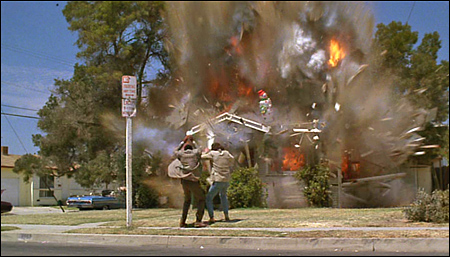
Body Count: 26
Best Kill: I’m a sucker for people getting shot while holding a container of liquid that also gets pierced by the bullet, so — Michael Hunsaker (Tom Atkins), getting sniped at his own daughter’s funeral while holding a carton of egg nog by Mr. Joshua, who zooms from out of no where in a helicopter.
Best Line: In reference to Murtaugh’s 50th birthday.
Riggs: Maybe we’ll stay alive long enough for me to buy you a present.
Corniest Line: Rescuing Murtaugh and Rianne.
Riggs: What did one shepherd say to the other shepherd? Let’s get the flock out of here!
Worst Line: Murtaugh: General McAlister. Time for you to die.
Riggs Worst Cop Moment: Pushing the Xmas tree/cocaine dealers into such a situation that they pulled out their guns, “forcing” him to kill everyone.
How Often Murtaugh Is Too Old For This Shit: 3
Richard Donner’s Political Propaganda: When Mr. Joshua breaks into the Murtaugh home, an Anti-Apartheid poster is prominently hung on their refrigerator.
Should There Be a Sequel: Didn’t you hear me when I said that this movie is the essence of a franchise? There is no mythology to worry about messing with. We should get like ten movies.

Up Next: Lethal Weapon 2.
DISCUSS THE FRANCHISE ON THE BOARDS
previous franchises battled
Critters
Death Wish
Hellraiser
Home Alone
Jurassic Park
Leprechaun
The Muppets
Phantasm
Planet of the Apes
Police Academy
Psycho
Rambo
Tremors